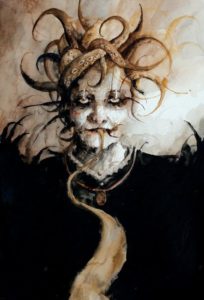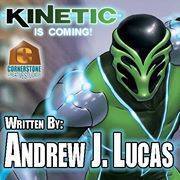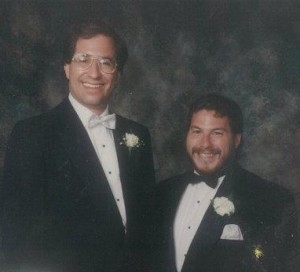Jun 16 2016
Interview with Brian Trent
Part of a series of interviews with the writers for the upcoming speculative fiction anthology, Clash of the Titles. the anthology is the brain child of Glen Bavel, who conceived of an endearing conceit: he provides a list of titles and the members of his Facebook workshop, Writing the Short (SF) Story, use it as a starting point for a short speculative fiction story.
Growing up, reading the works of Bradbury, Asimov and Clarke, Brian Trent began writing as a kid, filling up large yellow notebooks with fantastic stories of fantasy and science fiction. At some point Brian started getting published. His stories have appeared in ANALOG, Fantasy & Science Fiction, and Galaxy’s Edge, as well as a number of great anthologies. Most impressive, Brian is a winner in the 2013 Writers of the Future Contest. Recently, I had an opportunity to talk with Brian about his writing and his participation in the upcoming anthology, Clash of the Titles.
Why Speculative Fiction?
I love exploring possibilities, whether hopeful or grim, from how the future may unfold to the twisting paths that led us to today. Imagination is a wonderful engine in life.
What made you want to submit to the anthology? Would you do it again?
I loved the idea and the challenge. Gil, the editor, presented us with a list of titles, and asked us to compose a story around one of our choosing. And, I would absolutely do it again — he’s a great guy to work with.
How did you come up with your story? What made you choose that title?
The title I chose was “Vicious Cycle of Life.” It leapt out at me, suggesting Tennyson’s observation of nature as “red-in-tooth-and-claw.” But I didn’t want to do a simple monster story, so I started thinking of flora as opposed to fauna as a potential threat; there are some hideous cycles of life going on all around us. I also remembered reading years back about how a frozen mammoth was discovered with 30,000-year-old bacteria in its gut — and here’s the creepy part — once the gut was opened, the bacteria reawakened from their slumber. The story sprouted from there.
How is your story for the anthology the same and/or different from your other works?
“Vicious Cycle of Life” is chiefly a horror story, and while I do write and publish in horror, it forms the smallest portion of my work. I’m primarily a science fiction writer. The thing with horror fiction is that so much of it is often a rehash of ideas, so I was determined to craft something different from the surplus of vampires, serial killers, and shambling undead.
A lot has been said about the workshop process wherein the editor takes a video meeting with the writers to help offer instant feedback and share the editing process along the way. How did you find this process; what are your feelings about it?
It was a little different for me because “Vicious Cycle of Life” was accepted on its first draft; Gil was nice enough to make a public post about how much he enjoyed the story. Generally, though, writing workshops are invaluable tools. With a good mentor, it’s like being a sculptor’s apprentice — you’re shown how to shape and polish the creation, and clear away the rougher bits.
What do you think is the most important thing that readers know about Clash of the Titles?
This anthology is everything a reader could want, presenting a dazzling spectrum of tales that cover the past and future, the bright and dark, the farthest reaches of inner and outer space. Gil assembled a spectacular pool of talent. Short story collections have always been favorite reading past-times of mine. Clash of the Titles offers a kaleidoscope of bite-sized possibilities, like having your own literary Twilight Zone series at your fingertips.
It’s said that the editor will make an anthology every year. Even if the “I pick the titles, you write the story” conceit isn’t used again, would you work with the editor again? Why or why not?
I would gleefully work with the editor on any creative endeavor. For this project, he’s been like Jason assembling his Argonauts.
What do you think is the most important thing for booksellers, libraries and other outlets to know about Clash of the Titles that they don’t know?
There’s a challenge in standing out in the literary marketplace. You want to offer something unique and catchy and engrossing. Clash of the Titles offers all that and more — and the hook that these stories were written from a title prompt gives the whole thing an original genesis, with very original results.
Would you recommend the process to other writers; how did you find working with this editor to be compared to others?
I’ve been lucky in that I’ve never had a bad experience with an editor. And yes, I would heartily recommend other writers participating in a process like this.
What excites you most about the process, and the anthology in general?
I love composition, including the editing portion of it; stories don’t usually spring out of your head fully formed, but require attentive work and discipline to craft. I like variety in the work that I do, and writing for a specific anthology — with a specific prompt or theme — is a great way to challenge yourself as a writer. Having parameter restrictions can be like geological stresses that produce unusual gems.
Did your story grow in ways you didn’t expect due to the workshop nature of the process? How?
“Vicious Cycle of Life” is a grim and ghastly story. I wrote it in about a week’s time and had nightmares about it for most of that week, waking up in a sweat. That was unexpected.
Please describe your favorite experience in working with Clash of the Titles.
It’s a tie between getting to know Gil and composing the tale itself.
What other projects are you working on, besides Clash of the Titles.
I’m writing a series of novels that take place in the same universe: my particular vision of the future and the changes I think humanity will undergo. And I love writing short stories — a fair number of my tales will be published this year, and I’m always grateful to be a part of this industry. Writing stories is half the fun; sharing with a readership is the other half!
To learn more about Brian Trent, you can check out his website or follow him on Facebook.










